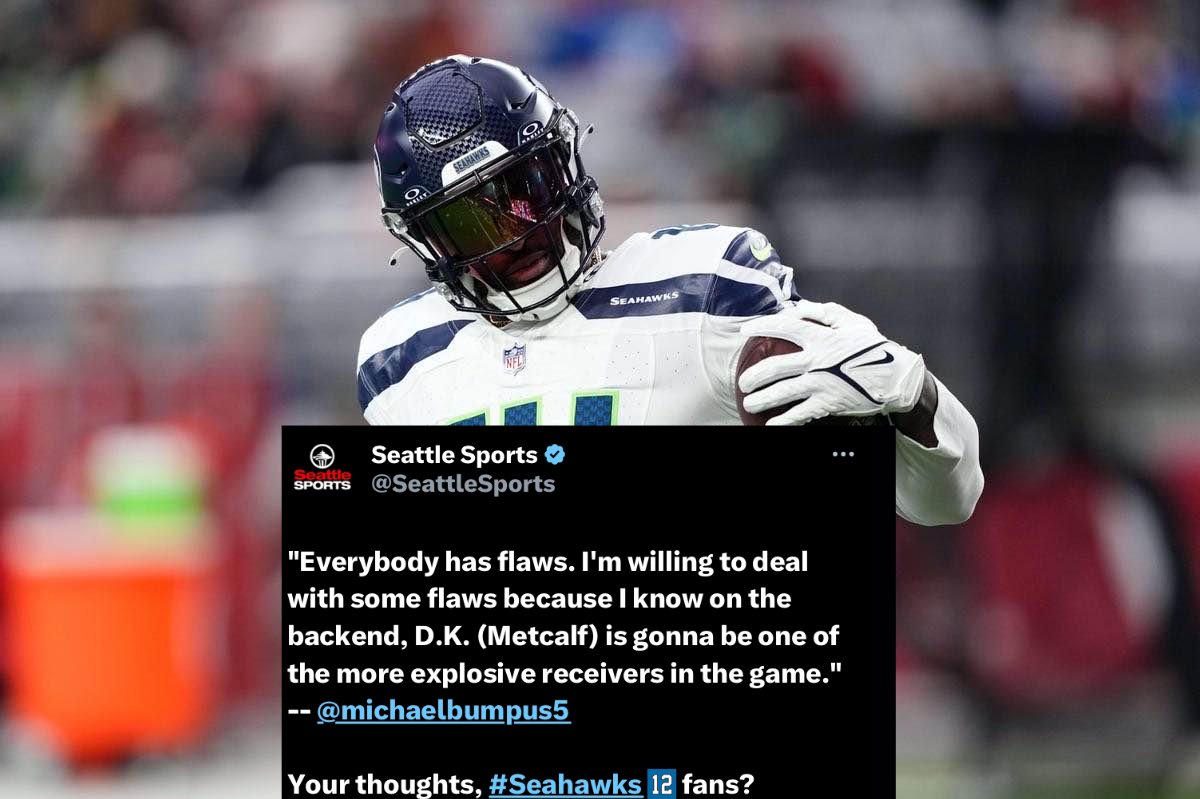A heated debate has taken over Seattle Seahawks fandom and the broader NFL community, revolving around the management’s decision regarding wide receiver DK Metcalf. As the Seahawks consider a contract extension for their star receiver, opinions are sharply divided. Some fans argue that keeping Metcalf is crucial to the team’s success, while others question whether he is worth the hefty price tag he is likely to command. The controversy centers on whether Metcalf’s production and potential justify the financial commitment, especially with the salary cap and the team’s broader roster-building needs in mind.
DK Metcalf, known for his physical prowess and playmaking ability, has been a game-changing presence for the Seahawks since entering the league in 2019. Standing at 6’4″ and weighing 235 pounds, Metcalf’s combination of size, speed, and strength makes him a nightmare matchup for opposing defenses. He has delivered highlight-reel moments, making crucial catches, breaking tackles, and burning defensive backs with his deep-threat capabilities. His chemistry with Seahawks quarterback Geno Smith has also helped keep Seattle’s offense competitive during a period of transition, making him a central piece in the Seahawks’ offensive strategy.
However, despite his clear talent, the question remains whether the Seahawks should offer Metcalf a long-term, high-value contract extension. The wide receiver market has seen a surge in recent years, with players like Tyreek Hill, Davante Adams, and Stefon Diggs signing lucrative deals that set a high standard for what elite receivers expect to earn. A new contract for Metcalf could very well place him among the top earners at his position, which means the Seahawks would be investing a significant portion of their salary cap into one player.
Fans advocating for the extension argue that Metcalf’s impact on the field is too valuable to let go. They point out that a receiver of his caliber is not easy to replace, and losing him could significantly weaken the Seahawks’ offensive firepower. Metcalf’s ability to stretch the field and draw attention from opposing defenses opens up opportunities for other players, making him a key component in the team’s overall offensive strategy. Additionally, at only 26 years old, Metcalf is still in his prime and could be a foundational piece for the Seahawks as they look to compete in the highly competitive NFC West.
Supporters of keeping Metcalf also point to his leadership qualities and work ethic, which have made him a fan favorite in Seattle. They see him as a player who embodies the gritty, hard-working mentality that has defined Seahawks football for years. Extending his contract, they argue, would send a message that the team is committed to retaining top talent and building around its core players.
On the other side of the debate, critics of a potential high-priced extension for Metcalf raise concerns about whether such a deal would be prudent from a financial perspective. They highlight that the Seahawks have several roster needs, including bolstering the offensive line, improving the pass rush, and adding depth to the secondary. With the NFL’s salary cap structure, a massive contract for Metcalf could limit the team’s flexibility to address these needs, potentially making it more difficult to field a well-rounded team. For these fans, the question is not about Metcalf’s talent but about whether the resources required to keep him could be better allocated elsewhere.
In addition to salary cap concerns, some critics point to Metcalf’s occasional inconsistency. While he has had spectacular performances, there have been stretches where his production has dipped, leading to questions about his ability to maintain elite-level performance throughout an entire season. They argue that while Metcalf is certainly a game-changer, the Seahawks might be better off spreading their financial investments across several players rather than committing a large chunk of their budget to one star receiver.
This debate reflects a broader trend in the NFL, where teams must balance the desire to retain elite talent with the reality of the salary cap. The decision facing the Seahawks is particularly challenging because it involves weighing Metcalf’s undeniable playmaking abilities against the long-term needs of the roster. It’s a gamble that could pay off if Metcalf continues to produce at a high level, but it also carries the risk of limiting the team’s ability to build a deep, competitive roster.
Ultimately, the controversy surrounding DK Metcalf’s potential extension has brought into focus the difficult decisions that come with managing an NFL roster. Fans on both sides have valid points, and the outcome of this decision will likely shape the Seahawks’ trajectory for the next several seasons. If Seattle chooses to invest in Metcalf, they’ll be banking on his ability to lead their offense and elevate the team in critical moments. If they decide to part ways or take a different approach, it could signal a shift towards a new direction, prioritizing depth and flexibility over a single star player.
As the season progresses and Metcalf’s role in the offense continues to evolve, Seahawks management will face increasing pressure to make the right call. For now, the debate rages on, with passionate arguments from fans and analysts on both sides. Whether Metcalf ultimately proves to be worth the investment or if the Seahawks decide to take a different route, one thing is certain: the decision will have a lasting impact on the future of Seattle football.
 BREAKING
BREAKING : Controversy Erupts as Fans React to Management’s Decision on DK Metcalf: Is seahawks DK Metcalf worth the money to extend him back?…READ DETAILS
: Controversy Erupts as Fans React to Management’s Decision on DK Metcalf: Is seahawks DK Metcalf worth the money to extend him back?…READ DETAILS
